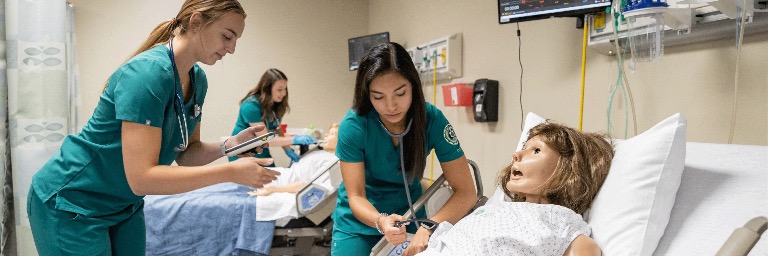Nursing Degree
Put compassionate care into practice. Nurses are needed now more than ever.
UND's nursing graduates consistently exceed the national NCLEX pass rate. Your bachelor's degree in nursing will lead to becoming a registered and licensed nurse. Our program emphasizes diverse populations and rural communities — two areas where nurses are in high demand.
- Program type:
- Major
- Format:
- On Campus
- Est. time to complete:
- 4 years
- Credit hours:
- 121
What is a bachelor of Nursing degree?
UND's Nursing Degree
-
Use state-of-the-art learning technology at the Clinical Resource and Simulation Center.
-
Ranked #1 Nursing School in North Dakota by Nursing Degree Search out of nine colleges in the state that offer four-year nursing degrees. We're also #1 Top Bachelor of Science in Nursing Program in ND by Nurse.org.
-
Experience four weeks of clinicals working with a preceptor to learn the role of the professional nurse.
-
Receive academic support and assistance as an American Indian student from our long standing, federally funded RAIN program.
-
Participate in the UND chapter of Sigma Theta Tau, a national nursing honor society, the UND Nursing Student Council, or the Nursing Student Association.
-
Earn your BSN from a nursing program accredited by the Commission on Collegiate Nursing Education (CCNE).
What can you do with a bachelor of nursing degree?
Bachelor of Nursing Degree Courses
FAQs
UND’s BSN degree typically takes four years to complete.
UND offers an RN to BSN program tailored for registered nurses who already hold a diploma or an associate’s degree in nursing and are looking to earn a BSN. This program is fully accessible online, providing convenience and flexibility for working nurses.
A BSN nurse refers to a professional who has earned a Bachelor of Science in Nursing. This degree represents the completion of an extensive nursing education, equipping nurses for a wide range of roles within the healthcare sector.
Registered nurses, as a role typically pursued by BSN graduates, earn a median annual wage of $81,220. However, salaries can vary based on factors such as location, experience and specific roles within the healthcare industry.
Yes, at UND, there are two BSN programs available: a standard BSN program, designed for first-year students or transfer students as well as an RN to BSN program, tailored for registered nurses with a diploma or associate’s degree in nursing.
Yes, UND’s Bachelor of Science in Nursing program incorporates rich clinical experiences. These experiences are a core component of the program, providing students with hands-on learning opportunities in various healthcare settings. The program is designed to ensure that students gain practical skills and real-world insights, essential for their future roles in nursing.
Leaders in Nursing
Anna Christian was chosen to conduct hands-on research at St. Jude’s Children Research Hospital.
